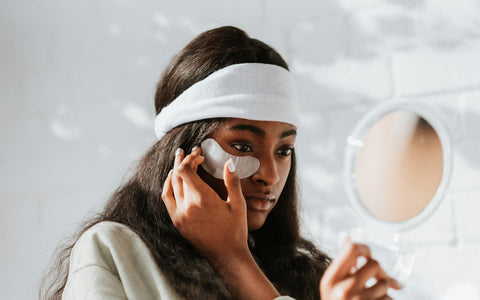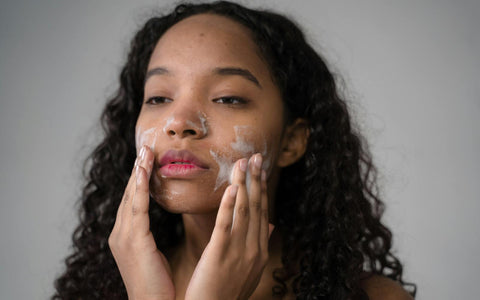
It’s no secret that while the sun is an important and necessary aspect of life, overexposure can harm the skin. And, while higher amounts of melanin are beneficial, the truth is, melanated skin is not immune to sun damage. In fact, it can manifest in a multitude of ways, often with long-term consequences. Educating yourself on effective sun protection, the effects of UV exposure, and general skin care, are crucial for maintaining healthy skin. With that in mind, let's get into all "the things" regarding sun damage on melanated skin.
What Does Sun Damage Look Like on Melanated Skin?
Hyperpigmentation
Darker skin tones are prone to developing patches of hyperpigmentation due to sun exposure. This presents as darker spots or uneven skin tone, commonly referred to as, "sun spots" or "age spots."
Sunburn
While melanin provides some natural protection against UV rays, it doesn't eliminate the risk of sunburn entirely. Though less sever than lighter skin tones, dark skin can still burn. Furthermore, repeated sunburns can lead to skin damage and increase the risk of skin cancer.
Skin Cancer
Despite lower rates compared to lighter-skinned individuals, people with darker skin tones can still develop skin cancer, including melanoma. The misconception that melanin provides complete protection often leads to delayed diagnosis and treatment.
Premature Aging
Sun exposure accelerates the aging process by breaking down collagen and elastin fibers in the skin. This can result in wrinkles, fine lines, and sagging skin, affecting individuals of all skin tones, including black and brown.
Dryness and Texture Changes
Prolonged sun exposure can deplete moisture from the skin, leading to dryness, flakiness, and texture changes. This can be particularly noticeable in areas exposed to the sun, such as the face, arms, and neck.
Photosensitivity Reactions
Some people with melanated skin may experience photosensitivity reactions when exposed to sunlight. These reactions may show as rashes, itching, or hives. Moreover, it can be exacerbated by certain medications or underlying skin conditions.
Uneven Tan Lines
It's true, darker skin tones can still tan. And, while it may appear less noticeable, prolonged sun exposure can still result in uneven pigmentation. This is especially true in areas where clothing provides partial protection.
The Importance of Sun Protection and Reapplication
Effective sun protection is essential for preserving the health and appearance of dark skin tones. Contrary to popular belief, sunscreen is not just for lighter skin tones. Everyone, regardless of skin color, should prioritize sun protection measures.

- Choose a broad-spectrum sunscreen with an SPF of 30 or higher. Look for sheer formulations or those specifically designed for darker skin tones to avoid the dreaded white cast that is notorious with thicker sunscreens.
- Reapply sunscreen every two hours, or more frequently if swimming or sweating heavily. Pay attention to commonly overlooked areas like the ears, neck, and tops of the feet.
- When outdoors, seek shade whenever possible, especially during peak sun hours between 10 a.m. and 4 p.m. Shade provides additional protection against harmful UV rays.
- Wear lightweight, tightly woven clothing that covers the skin, along with a wide-brimmed hat and UV-blocking sunglasses to shield the face and eyes from direct sunlight.
Tips on Caring for Sun-Damaged Darker Skin
If you've already experienced sun damage, there are steps you can take to repair, prevent and in some cases, reverse the damage.
Hydration
Moisturize regularly to replenish lost moisture and improve skin texture. Choose hydrating products containing ingredients like hyaluronic acid, glycerin, and ceramides.
Exfoliation
Incorporate gentle exfoliation into your skincare routine to slough off dead skin cells and promote cell turnover. Avoid harsh scrubs and opt for chemical exfoliants like alpha hydroxy acids (AHAs) or beta hydroxy acids (BHAs).
Treatment Serums
Look for serums containing antioxidants like vitamin C and niacinamide to help repair sun damage, reduce inflammation, and brighten the complexion.
Professional Treatments
Consider seeking professional treatments such as chemical peels, microdermabrasion, or laser therapy to target specific skin concerns and improve overall skin health.
Consistent Sun Protection
Continuously protect your skin from further damage by adhering to strict sun protection practices, including sunscreen use, seeking shade, and wearing protective clothing.

Myth-Busting Regarding Sun Exposure and Darker Skin Tones
Dispelling common myths surrounding sun exposure and melanated skin is essential for promoting sun safety and skin health:
Myth: Dark skin doesn't need sunscreen.
Reality: While melanin provides some natural protection, sunscreen is still necessary to prevent sun damage and reduce the risk of skin cancer.
Myth: Dark skin doesn't burn.
Reality: While darker skin tones have a higher natural SPF, they can still burn, albeit less severely than lighter skin tones. Sunburn damages the skin and increases the risk of skin cancer.
Myth: People with dark skin don't need to worry about skin cancer.
Reality: While the incidence of skin cancer is lower in individuals with darker skin tones, it can still occur. Delayed diagnosis and treatment due to misconceptions about skin cancer in people of color can lead to worse outcomes.
Sun damage is a significant concern for all skin tones, manifesting in various ways and carrying long-term consequences. Understanding the effects of sun exposure, prioritizing sun protection measures, and adopting effective skincare strategies are essential for maintaining healthy, radiant skin. By debunking myths, embracing traditional sun protection practices, and promoting sun safety, we can empower individuals of all skin tones to protect and care for their skin effectively. Let's bask in the sun's warmth responsibly, ensuring that our skin remains healthy and vibrant for years to come.

